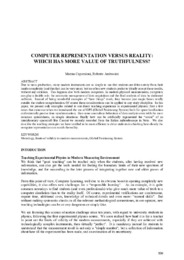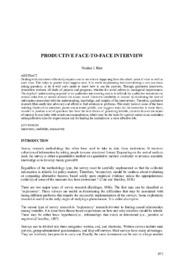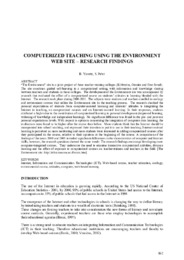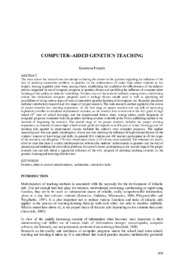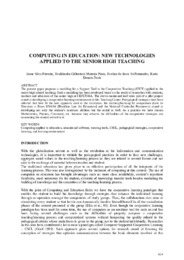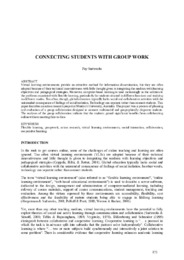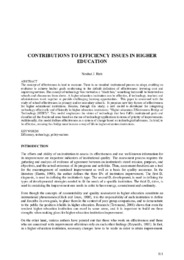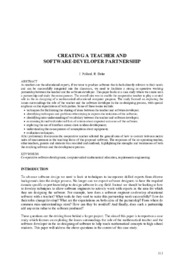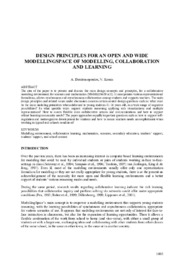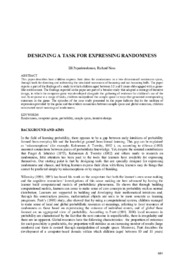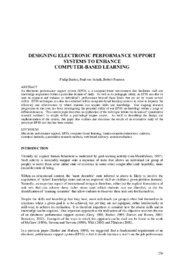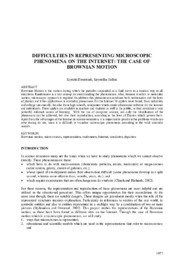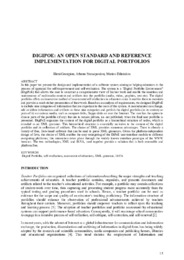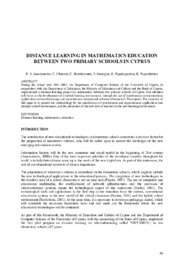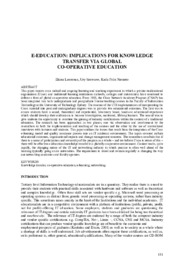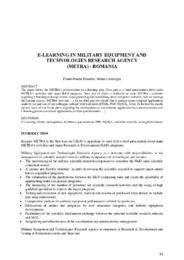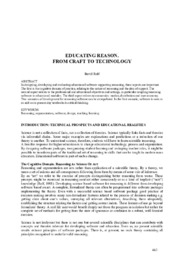Browsing CBLIS Conference Proceedings 2003 Volume I: New Technologies and their applications in education by Title
Now showing items 12-31 of 120
-
Computer representation versus reality: which has more value of truthfulness?
(Department of Educational Sciences, University of Cyprus, 2003)Due to mass production, many modern instruments are so simple to use that students are driven away from their inside complexity (and this fact can be very nice); but too often now students prefer to blindly accept those ... -
Computer-adaptive testing in science education
(Department of Educational Sciences, University of Cyprus, 2003)Dealing with interviews effectively requires one to see what is happening from the other's point of view as well as one's own. This helps to predict what happens next. It is worth emphasizing that interviewing is not just ... -
Computerized teaching using the environment Web site – research findings
(Department of Educational Sciences, University of Cyprus, 2003)“The Environment” site is a joint project of three teacher-training colleges (Kibbuzim, Oranim and Orot Israel). The site combines guided self-learning in a computerized setting, with information and knowledge sharing ... -
Computer–aided genetics teaching
(Department of Educational Sciences, University of Cyprus, 2003)The main aim of the research was the attempt at finding the answer to the question regarding the influence of the way of realizing curriculum problems in genetics on the achievements of junior high school students in this ... -
Computing in education: new technologies applied to the senior high teaching
(Department of Educational Sciences, University of Cyprus, 2003)The present paper proposes a modeling for a Support Tool to the Cooperative Teaching (STCT) applied to the senior high school teaching. Such a modeling has been developed based on the result of researches with students, ... -
Connecting students with group work
(Department of Educational Sciences, University of Cyprus, 2003)Virtual learning environments provide an attractive method for information dissemination, but they are often adopted because of their technical innovativeness with little thought given to integrating the medium with learning ... -
Contributions to efficiency issues in higher Education
(Department of Educational Sciences, University of Cyprus, 2003)The concept of effectiveness is hard to measure. There is no standard institutional process to adopt, enabling an evaluator to achieve his/her goals conforming to the default definition of effectiveness: lowering cost and ... -
Crafting the technological solutions in high school science and mathematic teaching and learning: matthew effects and the digital divide
(Department of Educational Sciences, University of Cyprus, 2003)This paper examines the practices and concepts used in teaching high school science and mathematics concepts (grade 9 - 12) which integrate computer and multimedia technologies and hands-on activities into disciplinebased ... -
Creating a teacher and software-developer partnership
(Department of Educational Sciences, University of Cyprus, 2003)As teachers are the educational experts, if we want to produce software that is both directly relevant to their needs and can be successfully integrated into the classroom, we need to facilitate a strong co-operative working ... -
Design principles for an open and wide Modellingspace of modelling, collaboration And learning
(Department of Educational Sciences, University of Cyprus, 2003)The aim of the paper is to present and discuss the main design concepts and principles, for a collaborative modeling environment for sciences and mathematics (MODELLINGSPACE). It incorporates various representational ... -
Designing a task for expressing randomness
(Department of Educational Sciences, University of Cyprus, 2003)This paper describes how children express their ideas for randomness in a two-dimensional continuous space, through tools for directing and redirecting the simulated movement of bouncing and not bouncing balls. The paper ... -
Designing electronic performance support systems to enhance computer-based learning
(Department of Educational Sciences, University of Cyprus, 2003)An electronic performance support system (EPSS) is a computer-based environment that facilitates skill and knowledge acquisition within a particular domain of study. As well as its pedagogic utility, an EPSS can also be ... -
Development of a computer assisted learning environment of electromagnetics at the undergraduate level
(Department of Educational Sciences, University of Cyprus, 2003)Conventional teaching of electromagnetics, based on lectures, static written materials, laboratories etc. has become rather difficult recently at all levels of education. The main objective of this paper is the development ... -
Development of children’s investigative skills through collaboration at a distance between two elementary schools in cyprus
(Department of Educational Sciences, University of Cyprus, 2003)The introduction of new educational technologies in elementary schools constitutes a decisive factor for the preparation of tomorrow's citizens, who will be called upon to respond to the challenges of the newly emerging ... -
Difficulties in representing microscopic phenomena on the internet: the case of brownian motion
(Department of Educational Sciences, University of Cyprus, 2003)Brownian Motion is the motion during which the particles suspended in a fluid move in a random way in all directions. Randomness is a key concept in understanding the phenomenon. Also, because it refers to molecular motion, ... -
Digipoe: an open standard and reference implementation for digital portfolios
(Department of Educational Sciences, University of Cyprus, 2003)In this paper we present the design and implementation of a software system aiming at helping educators in the process of appraisal for self-improvement and self-evaluation. The system is a "Digital Portfolio Environment" ... -
Distance learning in mathematics education between two primary schools in cyprus
(Department of Educational Sciences, University of Cyprus, 2003)During the school year 2001-2002, the Department of Computer Science of the University of Cyprus, in cooperation with the Department of Education, the Ministry of Education and Culture and the Bank of Cyprus, implemented ... -
E-education: implications for knowledge transfer via global co-operative education
(Department of Educational Sciences, University of Cyprus, 2003)This paper reports on a radical and ongoing learning and teaching experiment in which a private multinational organization (Cisco) and traditional learning institutions (schools, colleges and universities) have combined ... -
E-learning in military equipment and technologies research agency (metra) - Romania
(Department of Educational Sciences, University of Cyprus, 2003)The paper shows the METRA's achievements in e-learning area. First part is a brief presentation about main METRA’s activities and major R&D programs. Next part of paper is dedicated to main METRA’s activities regarding ... -
Educating reason. From craft to technology
(Department of Educational Sciences, University of Cyprus, 2003)In designing, developing and evaluating educational software supporting reasoning, three aspects are important. The first is the cognitive domain of practice, relating to the nature of reasoning and the idea of support. ...
